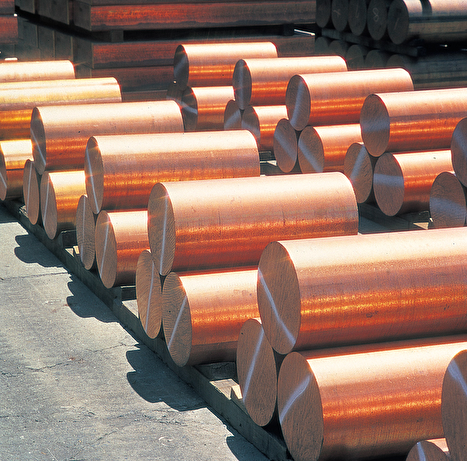Exploring the Diverse Applications of Copper Products in Modern Industries
From improving the effectiveness of electric systems to playing an essential function in renewable power technologies, the adaptability of copper is evident. As markets increasingly focus on innovation and sustainability, the diverse applications of copper require a closer exam, specifically concerning their potential impact on future technical improvements and ecological techniques.
Electrical Applications of Copper
Copper is a necessary material in the electric industry, accounting for approximately 60% of the total need for non-ferrous metals internationally - Copper Products. Its premium electric conductivity, which is virtually two times that of light weight aluminum, makes it the recommended option for a large range of electric applications. From circuitry systems in business and household structures to high-voltage power transmission lines, copper makes sure performance and dependability in electrical energy distribution
Along with wiring, copper is integral to the manufacturing of electric parts such as generators, electric motors, and transformers. These components take advantage of copper's thermal conductivity and malleability, vital for heat dissipation and effective performance. Copper's resistance to rust improves the lifespan and toughness of electrical systems, making it an economical option in the long term.
The development of renewable resource resources, such as solar and wind power, has actually additionally enhanced the need for copper in electric applications. As sectors transition towards lasting energy services, copper's role ends up being much more essential. Overall, the flexibility and efficiency qualities of copper solidify its status as a foundation product within the electric sector, driving development and effectiveness across different applications.
Plumbing and Piping Solutions
In modern plumbing systems, the option of materials considerably influences both capability and long life. Copper has actually become a recommended option due to its unique residential or commercial properties, including rust resistance and antimicrobial attributes. These characteristics guarantee that copper piping stays risk-free and long lasting for delivering potable water, a crucial factor to consider in household and industrial applications.
Among the key benefits of copper in plumbing is its capacity to endure high temperature levels and pressures, making it suitable for a selection of applications, from warm water systems to home heating and cooling networks. Additionally, copper's versatility enables simpler installation in complicated piping layouts, minimizing the danger of failings and leaks.
One more noteworthy benefit is copper's lengthy life expectancy, often going beyond half a century with appropriate maintenance. This durability not just reduces replacement prices but additionally contributes to sustainable practices by minimizing waste. Copper's recyclability aligns with contemporary ecological standards, promoting a circular economic climate within the plumbing market.
Copper in Renewable Resource
The flexibility of copper expands past plumbing applications, playing a crucial function in the eco-friendly energy market. In solar panels, copper is made use of in photovoltaic or pv cells and circuitry, promoting efficient energy conversion and transmission.

Moreover, as the global need for electrical cars (EVs) increases, copper's function in battery systems and charging infrastructure ends up being a lot more considerable. The material's capacity to conduct electrical power effectively is integral to the efficiency of EV batteries, boosting range and billing rate.
Copper's Role in Electronics
Electronic devices making counts greatly on copper's exceptional properties, particularly its high electric conductivity and click this thermal efficiency. These characteristics make copper an ideal choice for a broad variety of digital components, consisting of connectors, circuit card, and circuitry. The steel's capacity to effectively transfer electrical signals guarantees marginal energy loss, which is essential in high-performance digital tools.
Moreover, copper's thermal conductivity plays a substantial duty in heat dissipation, protecting delicate elements from overheating. This is especially crucial in modern-day electronic devices, where compact layouts cause boosted heat generation. Copper is likewise favored for its pliability and ductility, enabling it to be easily formed into complex designs that fulfill the demands of innovative electronic applications.
With the increase of customer electronic devices, telecoms, and electrical vehicles, the demand for copper in the electronic devices industry continues to grow. Hence, copper continues to be a cornerstone material in the ever-expanding area of electronic devices.
Cutting-edge Uses in Manufacturing

One noteworthy application is in additive manufacturing, where copper-based products are employed in 3D printing processes. This enables the creation of light-weight components and complex geometries, specifically in the aerospace and automotive fields. In addition, copper's thermal conductivity makes it an optimal selection for warm exchangers, boosting efficiency in commercial cooling systems.
Furthermore, the increase of smart manufacturing has actually seen the consolidation of copper in IoT gadgets, where its conductive capabilities support innovative noticing technologies. In the realm of sustainable energy, copper is crucial in the manufacturing of photovoltaic panels and wind generators, helping with a lot more efficient energy conversion and circulation.
As markets pursue sustainability and innovation, copper's convenience and efficiency remain to position it as a crucial material, driving advancements in manufacturing and adding to the advancement of smarter, more reliable items.
Final Thought
The integral role of copper in renewable energy and its vital click here for more info function in electronic devices highlight its value in advancing sustainable methods. Jointly, these applications illustrate copper's important contribution to technological progression and industrial efficiency in modern society.
From enhancing the performance of electrical systems to playing a critical function in renewable energy modern technologies, the adaptability of copper is evident. As sectors progressively focus on innovation and sustainability, the diverse applications of copper call for a closer evaluation, specifically concerning their potential effect on future technical advancements and ecological practices.
The growth of eco-friendly power resources, such as solar and wind power, has actually further enhanced the need for copper in electrical applications. On the whole, the flexibility and performance attributes of copper strengthen its status as a foundation material within the electrical sector, driving development and effectiveness across numerous have a peek at this site applications.
The versatility of copper expands past plumbing applications, playing an important duty in the sustainable energy sector.